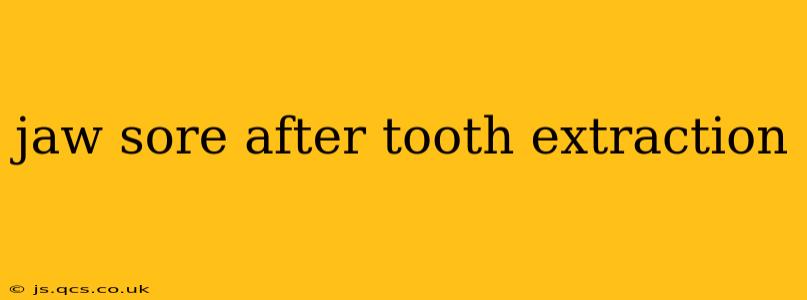A sore jaw after a tooth extraction is a common experience, and while usually temporary, it can be quite uncomfortable. Understanding the causes, effective treatments, and preventative measures can significantly improve your recovery and alleviate pain. This comprehensive guide addresses common concerns and offers practical advice to manage post-extraction jaw soreness.
What Causes Jaw Soreness After Tooth Extraction?
Jaw pain following tooth extraction stems from several factors, all related to the surgical procedure and your body's healing response:
-
Surgical Trauma: The extraction process itself involves manipulating the jawbone and gum tissue, causing inherent inflammation and soreness. The extent of this trauma depends on the complexity of the extraction. Impacted wisdom teeth extractions, for example, often lead to more significant discomfort.
-
Inflammation: Your body's natural inflammatory response to the wound plays a crucial role. Swelling and pain are part of the healing process, aimed at repairing damaged tissues. This inflammation can extend beyond the extraction site, affecting the surrounding jaw muscles.
-
Muscle Strain: During the extraction, you might unconsciously tense your jaw muscles. This tension, combined with the discomfort of the procedure, can lead to prolonged jaw soreness. Some individuals clench their jaw more during sleep, exacerbating the problem.
-
Infection (Rare but Serious): While less common with proper post-operative care, infection can cause significant jaw pain and requires immediate medical attention. Signs of infection include increased pain, swelling, fever, and pus.
How Long Does Jaw Soreness After Tooth Extraction Last?
The duration of jaw soreness varies considerably depending on the complexity of the extraction and individual healing responses. Generally, you can expect some level of discomfort for the first few days, with the most intense pain subsiding within the first 24-48 hours. Most patients report significant improvement within a week. However, some lingering mild soreness might persist for several more days or even a couple of weeks in more complex cases.
What Can I Do to Relieve Jaw Soreness After Tooth Extraction?
Several methods effectively alleviate jaw soreness:
-
Over-the-Counter Pain Relievers: Ibuprofen or acetaminophen (paracetamol) are generally recommended. Always follow the dosage instructions on the packaging.
-
Ice Packs: Applying ice packs to the affected area in 20-minute intervals, several times a day, reduces swelling and numbs the pain.
-
Rest: Resting your jaw and avoiding strenuous activities is vital for healing. This means limiting talking, chewing, and yawning.
-
Soft Foods: Stick to soft, easily chewable foods like soups, yogurt, applesauce, and mashed potatoes during the first few days.
-
Saltwater Rinses: Gentle saltwater rinses can help keep the extraction site clean and prevent infection.
-
Prescription Medications: Your dentist may prescribe stronger pain relievers or antibiotics if necessary.
How Can I Prevent Jaw Soreness After Tooth Extraction?
While some soreness is inevitable, taking proactive steps can minimize discomfort:
-
Follow Your Dentist's Instructions: Carefully follow all post-operative instructions provided by your dentist. This includes medication regimens, dietary recommendations, and oral hygiene practices.
-
Avoid Smoking: Smoking significantly impairs healing and increases the risk of infection.
-
Manage Stress: Stress can impact healing. Engage in relaxation techniques like deep breathing or meditation to manage stress levels during recovery.
Is Jaw Pain After a Tooth Extraction Normal?
Yes, some degree of jaw pain is completely normal after a tooth extraction. The level of pain and duration vary greatly depending on several factors, but mild to moderate discomfort is expected. However, it's crucial to distinguish between normal post-operative pain and signs of complications. Seek immediate medical attention if you experience severe pain that doesn't respond to pain relievers, excessive swelling, fever, or signs of infection.
When Should I See a Dentist After a Tooth Extraction?
Contact your dentist immediately if you experience:
- Severe pain not relieved by over-the-counter medication
- Excessive bleeding or swelling
- Signs of infection (fever, pus, increased pain)
- Numbness that persists longer than expected
- Dry socket (a painful complication where the blood clot is dislodged)
By understanding the causes, treatment options, and preventative measures for jaw soreness after a tooth extraction, you can navigate the recovery process more comfortably and effectively. Remember to always consult your dentist if you have any concerns.
